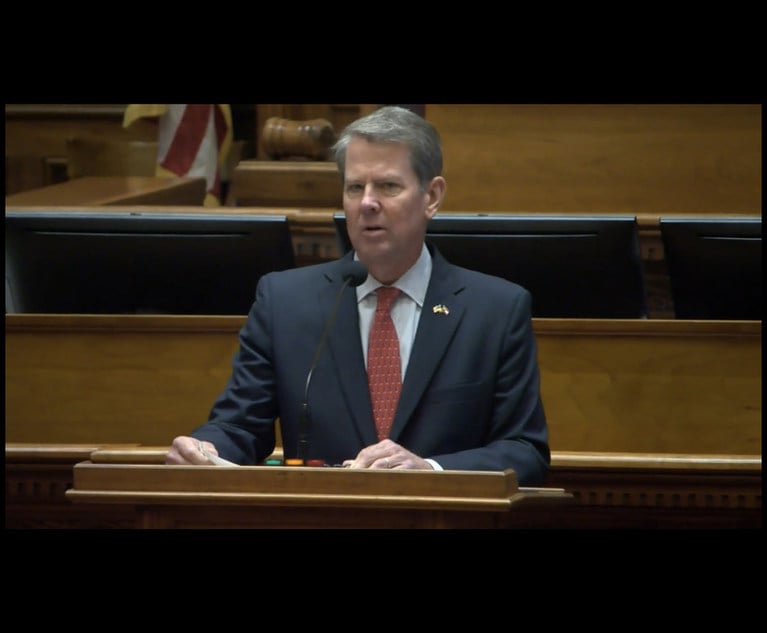Dismissed From Election Contest, Secretary of State Counsel Still Exert Influence
Attorneys for Georgia's secretary of state won a dismissal of their client from a lawsuit contesting the election of Republican Lt. Gov. Geoff Duncan, but the lawyers haven't left the legal playing field.
January 16, 2019 at 11:42 AM
6 minute read
 Josh Belinfante (Photo: John Disney/ALM)
Josh Belinfante (Photo: John Disney/ALM)
Despite winning a dismissal for their client last week, counsel for Georgia's secretary of state are still in the case over a challenge to the election of Lt. Gov. Geoff Duncan.
Ryan Germany—who served as Gov. Brian Kemp's general counsel when Kemp was secretary of state and remained in place after Kemp stepped down last November—showed up at a Fulton County warehouse Monday to instruct county election officials who remain defendants in the case on how to carry out court-ordered discovery.
Germany brought with him Michael Barnes, a member of the secretary of state's election division, to help advise Fulton County lawyers and the county election staff, according to a flurry of court filings filed Tuesday.
Germany's instructions, even though his agency is no longer a party, clashed with recommendations made by the plaintiff's computer expert on how to inspect the electronic voting machines and their internal memory without destroying or altering the data. The electronic voting machines—and whether a programming error or another anomaly resulted in uncounted votes—are central to the election challenge,
 Bruce Brown (Photo: John Disney/ALM)
Bruce Brown (Photo: John Disney/ALM)Germany's recommended protocols, as carried out by Fulton County, effectively barred the plaintiffs' computer expert from conducting the inspections the plaintiffs sought, according to filings by their counsel, Atlanta attorney Bruce Brown.
As a result, Brown quickly sought a continuance of Thursday's scheduled trial. The plaintiffs, Brown said, “have still not been granted access to the electronic voting equipment and related electronic records” they first sought in an emergency motion filed Nov. 29.
Last week, Senior Superior Court Judge Adele Grubbs, the judge assigned to hear the case, set the trial date, giving the plaintiffs just a week to inspect electronic voting machines in three counties and prepare for trial.
Brown's motion for a continuance prompted a formal objection on Tuesday from Atlanta attorney Joshua Belinfante on behalf of the secretary of state, who is no longer a party in the case. As special assistant state attorneys general, Belinfante and co-counsel Vincent Russo successfully argued to dismiss the secretary of state from the case last week.
By Tuesday night, attorneys for the other defendants in the case—including the new lieutenant governor and election officials in Fulton and Gwinnett counties—had weighed in with responses adopting the secretary of state's objections to a continuance of the scheduled trial. Duncan's counsel, Edward Lindsey of Dentons' Atlanta office, also renewed his motion to dismiss the case.
Lindsey contends that, even if the plaintiffs' allegations are true, “The simple math does not place the outcome of the race in question in doubt,” given Duncan's 123,172 vote margin of victory over his Democratic opponent, Sarah Riggs Amico.
On Wednesday morning, Grubbs refused to continue the case.
Belinfante declined to say Tuesday why he was arguing motions on behalf of the secretary, even though the office is no longer a party. Germany could not be reached.
Brown represents plaintiff voters from Fulton and Morgan counties; Smythe Duval, the defeated Libertarian candidate for secretary of state; and the nonprofit Coalition for Good Governance, which filed the election challenge. Amico is not a plaintiff.
A forensic inspection of the aging voting machines is key to the election challenge. The suit claims that “multiple unexplained failures” of the state's electronic voting machines skewed the lieutenant governor's race against Amico.
According to the suit, which mirrored concerns Amico expressed in a letter to Secretary of State Robyn Crittenden shortly after Crittenden replaced Kemp, voters appeared to have skipped voting for lieutenant governor more than any other statewide election, including four down-ballot races. But that pattern was reflected only in votes cast on electronic voting machines, not in the paper absentee and provisional ballots that were cast.
After deciding last week, Grubbs gave the plaintiffs one week to inspect a number of electronic voting machines in Fulton, Henry and Worth counties, while barring them from copying any of the data. They also had to prepare for Thursday's trial.
Germany, working for the new secretary of state, Brad Raffensperger, was sworn in by Kemp on Monday. He replaced Crittenden, who was appointed to replace Kemp when he stepped down midway through a federal court hearing seeking his ouster before the election results were certified. Kemp, Duncan and Raffensperger are Republicans.
On Monday, Germany sent an email to a lawyer representing Henry County election officials, saying he had a “protocol” for inspecting the Fulton County voting machines—one the plaintiffs had found was insufficient. In describing how the plaintiffs' expert had recommended inspecting the internal memory of the voting machines, Germany warned, “This is not something we can allow, and it is not something that we think the judge's order allows.”
Fulton County Senior Assistant County Attorney Cheryl Springer said secretary of state personnel were present when Brown and his clients were scheduled Monday to inspect the machines because the database and server used in conjunction with the electronic voting machines is owned by the state, and the Secretary of State “is the chief election officer and oversees the unified voting system in Georgia.”
“In seeking to comply with the court's order and in ensuring that the owner of part of the equipment which was being inspected was aware of the proposed inspection, Fulton County had state personnel present,” Springer said.
Brown, the plaintiffs' lawyer, told The Daily Report: “I'm not aware of any argument that, just because they own the machines, that they are entitled to instruct the counties to not comply with the court's order.”
“The Court ordered the defendants to allow plaintiffs to examine the internal memory of the [electronic voting] machines. There is no dispute that Fulton County has not done so,” Brown wrote in one filing. “Fulton County did not even make its machines available until yesterday [Monday], three days before trial, and, when it did so, it was technically unable to give plaintiffs access to the internal memory. This is undisputed.”
“The essential fact remains that plaintiffs, now 36 hours from trial, have not been granted the limited discovery that this Court ordered—and that plaintiffs originally sought six weeks ago,” Brown concluded.
This content has been archived. It is available through our partners, LexisNexis® and Bloomberg Law.
To view this content, please continue to their sites.
Not a Lexis Subscriber?
Subscribe Now
Not a Bloomberg Law Subscriber?
Subscribe Now
NOT FOR REPRINT
© 2025 ALM Global, LLC, All Rights Reserved. Request academic re-use from www.copyright.com. All other uses, submit a request to [email protected]. For more information visit Asset & Logo Licensing.
You Might Like
View All
Georgia Republicans Push to Limit Lawsuits. But Would That Keep Insurance Rates From Rising?
5 minute read
A Plan Is Brewing to Limit Big-Dollar Suits in Georgia—and Lawyers Have Mixed Feelings
10 minute read
Panel to Decide if Governor Should Suspend Georgia Lawyer From Elected Post
4 minute readTrending Stories
- 1Uber Files RICO Suit Against Plaintiff-Side Firms Alleging Fraudulent Injury Claims
- 2The Law Firm Disrupted: Scrutinizing the Elephant More Than the Mouse
- 3Inherent Diminished Value Damages Unavailable to 3rd-Party Claimants, Court Says
- 4Pa. Defense Firm Sued by Client Over Ex-Eagles Player's $43.5M Med Mal Win
- 5Losses Mount at Morris Manning, but Departing Ex-Chair Stays Bullish About His Old Firm's Future
Who Got The Work
J. Brugh Lower of Gibbons has entered an appearance for industrial equipment supplier Devco Corporation in a pending trademark infringement lawsuit. The suit, accusing the defendant of selling knock-off Graco products, was filed Dec. 18 in New Jersey District Court by Rivkin Radler on behalf of Graco Inc. and Graco Minnesota. The case, assigned to U.S. District Judge Zahid N. Quraishi, is 3:24-cv-11294, Graco Inc. et al v. Devco Corporation.
Who Got The Work
Rebecca Maller-Stein and Kent A. Yalowitz of Arnold & Porter Kaye Scholer have entered their appearances for Hanaco Venture Capital and its executives, Lior Prosor and David Frankel, in a pending securities lawsuit. The action, filed on Dec. 24 in New York Southern District Court by Zell, Aron & Co. on behalf of Goldeneye Advisors, accuses the defendants of negligently and fraudulently managing the plaintiff's $1 million investment. The case, assigned to U.S. District Judge Vernon S. Broderick, is 1:24-cv-09918, Goldeneye Advisors, LLC v. Hanaco Venture Capital, Ltd. et al.
Who Got The Work
Attorneys from A&O Shearman has stepped in as defense counsel for Toronto-Dominion Bank and other defendants in a pending securities class action. The suit, filed Dec. 11 in New York Southern District Court by Bleichmar Fonti & Auld, accuses the defendants of concealing the bank's 'pervasive' deficiencies in regards to its compliance with the Bank Secrecy Act and the quality of its anti-money laundering controls. The case, assigned to U.S. District Judge Arun Subramanian, is 1:24-cv-09445, Gonzalez v. The Toronto-Dominion Bank et al.
Who Got The Work
Crown Castle International, a Pennsylvania company providing shared communications infrastructure, has turned to Luke D. Wolf of Gordon Rees Scully Mansukhani to fend off a pending breach-of-contract lawsuit. The court action, filed Nov. 25 in Michigan Eastern District Court by Hooper Hathaway PC on behalf of The Town Residences LLC, accuses Crown Castle of failing to transfer approximately $30,000 in utility payments from T-Mobile in breach of a roof-top lease and assignment agreement. The case, assigned to U.S. District Judge Susan K. Declercq, is 2:24-cv-13131, The Town Residences LLC v. T-Mobile US, Inc. et al.
Who Got The Work
Wilfred P. Coronato and Daniel M. Schwartz of McCarter & English have stepped in as defense counsel to Electrolux Home Products Inc. in a pending product liability lawsuit. The court action, filed Nov. 26 in New York Eastern District Court by Poulos Lopiccolo PC and Nagel Rice LLP on behalf of David Stern, alleges that the defendant's refrigerators’ drawers and shelving repeatedly break and fall apart within months after purchase. The case, assigned to U.S. District Judge Joan M. Azrack, is 2:24-cv-08204, Stern v. Electrolux Home Products, Inc.
Featured Firms
Law Offices of Gary Martin Hays & Associates, P.C.
(470) 294-1674
Law Offices of Mark E. Salomone
(857) 444-6468
Smith & Hassler
(713) 739-1250







